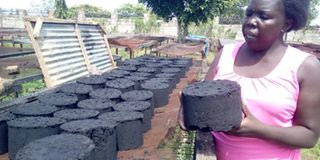Prime
Adopt clean cooking to reduce forest cover loss

What you need to know:
- Noteworthy is that there is still heavy dependence on biomass due to high level of poverty. Moreover, Uganda’s rapid population growth, coupled with rapid urbanisation, has increased the demand for energy, especially cooking fuel. This calls for creation of awareness of clean cooking solutions which is a giant step towards environmental conservation.
In May, President Museveni signed an executive order banning tree cutting for commercial charcoal production, which is an impression of climate action.
However, to successfully enforce the presidential directive, affordable clean cooking alternatives have to be fronted and supported. The clean cooking alternatives reduce carbon emissions and deforestation.
Noteworthy is that there is still heavy dependence on biomass due to high level of poverty. Moreover, Uganda’s rapid population growth, coupled with rapid urbanisation, has increased the demand for energy, especially cooking fuel. This calls for creation of awareness of clean cooking solutions which is a giant step towards environmental conservation.
The way we cook our meals can have far-reaching consequences on the environment, our health, and the overall sustainability of our planet.
According to Global Forest Watch from 2001 to 2021, Uganda lost 967kha of tree cover, equivalent to a 12 percent decrease in tree cover since 2000, and 438Mt of carbon emissions. In addition, National Forest Authority (NFA) reveals that more than 73,000 hectares of private forest are cleared every year across the country and over 7,000ha of protected forest reserves are destroyed annually for timber and charcoal.
More so, it is absurd that available figures indicate that only 1.4 percent of households in Uganda use electricity and other non-biomass options such as Liquified Petroleum Gas (LPG) to cook. This is linked to exorbitant power tariffs, high levels of poverty, and a lack of awareness of clean cooking alternatives, among others.
In light of the above, below are the formidable reasons why clean cooking should be promoted in Uganda;
Briquettes are more efficient than charcoal due to their increase in heating value (High Calorific Value: around 4000-4600). Briquettes also burn more reliably than other biomass fuels like charcoal and firewood. They burn at a constant temperature, which makes them efficient.
Modern cooking stoves: These are more efficient and emit less emissions in addition to saving charcoal and money. Modern cookstoves consume up to 40 percent less fuel than traditional cookstoves. The cookstoves have the potential to save a family 20 percent of their daily expenses as they use less charcoal per day. The CO2 emission saving of the stove is found to be 1.3 tCO2/year.
Cooking Wonderbags: The Wonderbag is a simple, non-electric slow cooker. It is a heavily insulated bag that uses the principle of heat retention to cook the food slowly. After bringing a pot of food to boil and placing it in a Wonderbag, the food will continue cooking for up to eight hours without any additional energy source. The Wonderbag can support cooking of ordinary foods like matooke, rice, beans and others. The wonder bag saves at least 30 percent of the total fuel costs associated with cooking using charcoal or firewood, reduces deforestation by three times and carbon emissions by half a tonne every year and it also preserves 100 percent food nutrients since there is no evaporation.
Electric pressure cookers (EPC) are predominantly for households with access to electricity. They heat more efficiently and effectively, which saves electricity bills and makes cooking, faster, easier and more affordable. Research by Uganda’s Centre for Research in Energy and Energy Conservation (CREEC) reveals the following:
•Cooking beans with an electric pressure consumes 0.6 Kilowatt hours (kWh), which is equal to 0.6 units of electricity. Using an electric hotplate would consume 2.1kWh, or 2.1 units.
•The comparable figures for cooking matooke would be 0.35kWh or 0.3 units and 1.1kWh or 1.1 units respectively.
Anchoring on the above benefits of clean cooking, the agenda of climate action and justice is elevated. Its high time we acted than depending on lip service.
Humanity is at “code red” to address climate change and halt the spiralling loss of biodiversity. As governments and corporations hunt for opportunities to meet their commitments to align net-zero carbon emissions, clean cooking must not be ignored. The transition to clean and efficient cooking solutions should be central to policy, investment, and supply chain decisions.
Access to clean cooking technologies and fuels improves the quality of life and resilience for millions of individuals, particularly those living in energy poverty and those most vulnerable to the impacts of climate change.
As we advance to enforce the presidential directive sustainably it is indispensable that clean cooking has to be adopted to make charcoal ban a reality hence conserving the environment for sustainable development.
Finally, I call upon the Ministry of Energy and Mineral Development to support the private sector to conduct awareness raising to increase the uptake of clean cooking energy alternatives that will reduce pressure on Uganda’s forests and contribute to carbon offsetting.
Babra Kembabazi, [email protected]




